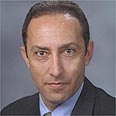
The High Court of Justice has rejected a petition filed by the Shurat Hadin ("letter of the law") organization, asking to revoke the press credentials given by the Israeli Government Press Office (GPO) to the French television reporter who covered the killing of Muhammad al-Durrah in the Gaza Strip in September 2000.
The report, which aired on France 2 TV channel, suggested that al-Durrah was hit by Israeli fire at the Netzarim Junction, and further stated that the boy's death was one of the reasons for Arab-Israeli riots and the second Palestinian Intifada.
In their ruling, the judges recounted the story's background: With the eruption of event later known as the Second Intifada, a crossfire ensued between IDF forces and Palestinian police officers in the Gaza Strip settlement of Netzarim. These events were reported in a story aired by the network that same day.
France 2 reporter Charels Enderlin further reported that several civilians were caught in the crossfire and that one of them, 12-year-old Muhammad al- Durrah, was killed. His father, who was with him and tried to protect him, was injured.
France 2 then distributed the story to the international media and its Arab affiliates, resulting in it being aired worldwide. The following day, and based on the televised report, Major-General Giora Eiland, said al-Durra was probably killed by IDF fire, and that the IDF deeply regretted the incident.
'Defying the laws of physics'
Shortly thereafter, doubts arose as to the circumstances surrounding al-Durrah and his father's injuries, at which time Southern Command Chief Major-General Yom-Tov Samiya ordered an investigation. Further ballistic analysis determined that the position of the IDF post at the site and the angel of the shooting placed al-Durrah and his father out of harms way, and therefore it was highly unlikely that they were hit by IDF fire.
Several reports published by the foreign media also concluded that al-Durrah and his father could not have been hit by IDF fire, and several others supported the theory which suggested the "killing scene" was staged. Both France 2 and its reporter, Charels Enderlin, filed slander suits as a result but those were denied.
GPO Director Danny Seaman said that "the long quest for the truth is underway. We know that the events of that day were, in fact, staged by the network's cameraman… the Israeli committee of inquiry included physicians, forensic and ballistics experts, and determined that the events couldn't have possibly happen in the manner depicted by the report without defying the laws of physics."
Seaman, however did not support revoking the press card, saying there was no proof France 2 sanctioned the cameraman's actions.
The judges further noted that "none of the requirements for a press card, as presented by the GPO, stipulates that it should be given or revoked based on the quality of the journalistic work. This approach coincides with the principles of freedom of speech and of the press, which any democracy is bound by."















